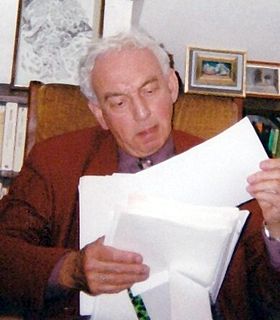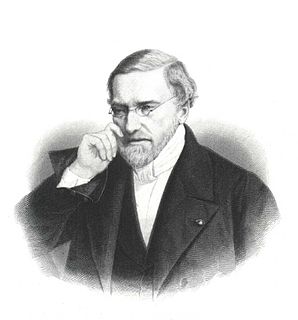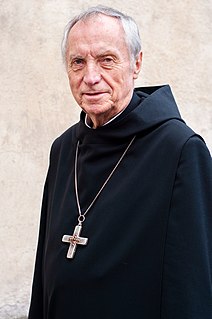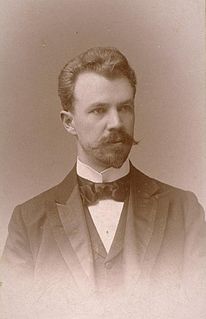A Quote by Ivor Grattan-Guinness
In addition, the teaching of theories from axioms, or some close imitation of them such as the basic laws of an algebra, is usually an educational disaster.
Related Quotes
In fact, Gentlemen, no geometry without arithmetic, no mechanics without geometry... you cannot count upon success, if your mind is not sufficiently exercised on the forms and demonstrations of geometry, on the theories and calculations of arithmetic ... In a word, the theory of proportions is for industrial teaching, what algebra is for the most elevated mathematical teaching.
The so-called Church Fathers are not some theologians as we know them nowadays. They were close to the teaching of the Apostles conveying the teaching of those who were close to Jesus. Their theology and wisdom is close to everyday life. We have to thank John Michael Talbot that he has been able to unearth the treasures of those times. This was only possible because he himself in his community experiences the Gospel lived out in our times.
Imitation is very easy, and the whole culture and society depends on imitation. Everybody is telling you how to behave, and whatsoever they are teaching you is nothing but imitation. Religious people - the so-called religious people, the priests, the theologians - they are also teaching you, `Be like Jesus, be like Buddha, be like Krishna.` Nobody ever tells you, `Just be yourself` - nobody. Everybody is against you, it seems. Nobody allows you to be yourself, nobody gives you any freedom. You can be in this world, but you must imitate somebody.
Are our ways of teaching students to ask some questions always correlative with our ways of teaching them not to ask - indeed, to be unconscious of - others? Does the educational system exist in order to promulgate knowledge, or is its main function rather to universalize a society’s tacit agreement about what it has decided it does not and cannot know?
Psychologists would say that the only two important forms of social learning are imitation and teaching, and they will spend time trying to figure out if animals imitate or teach. Sometimes they find they do; sometimes they find they don't. And so that's kind of the level of controversy there. Biologists would include imitation and teaching and a range of other kinds of social learning. So we would call that culture, whereas the psychologist wouldn't.
Our minds are specifically adapted to developing certain theories, and we have a science if the theories that are available to our minds happen to be close to true. Well, there is no particular reason to suppose that the intersection of true theories and theories that are accessible to the mind is very large. It may not be very large.
There are and can be only two ways of searching into and discovering truth. The one flies from the senses and particulars to the most general axioms, and from these principles, the truth of which it takes for settled and immovable, proceeds to judgment and to the discovery of middle axioms. And this way is now in fashion. The other derives axioms from the senses and particulars, rising by a gradual and unbroken ascent, so that it arrives at the most general axioms last of all. This is the true way, but as yet untried.
How odd that Americans, and not just their presidents, have come to think of their Constitution as something separable from the government it's supposed to constitute. In theory, it should be as binding on rulers as the laws of physics are on engineers who design bridges; in practice, its axioms have become mere options. Of course engineers don't have to take oaths to respect the law of gravity; reality gives them no choice. Politics, as we see, makes all human laws optional for politicians.
I think the next [21st] century will be the century of complexity. We have already discovered the basic laws that govern matter and understand all the normal situations. We don't know how the laws fit together, and what happens under extreme conditions. But I expect we will find a complete unified theory sometime this century. The is no limit to the complexity that we can build using those basic laws.
































